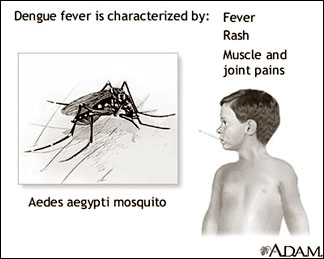|

Dengue could overtake you...
by Shanika SRIYANANDA
 Continuous
showers have alarmed the people about a rapid increase of dengue fever
with over 119 reported cases during the past two weeks of this month. Continuous
showers have alarmed the people about a rapid increase of dengue fever
with over 119 reported cases during the past two weeks of this month.
Though there is a slight decrease of five per cent compared to 2007,
the epidemiologists warn the possibility of it increasing in the coming
weeks and until next February as people have abandoned their efforts to
have 'clean and tidy' environs. Consultant Community Physician of the
Epidemiology Unit Dr. Hasitha Tissera said that of the total dengue
cases reported (6,149) this year, the highest number of dengue patients
(1,538) were reported from Colombo with 10 deaths. "This is a seasonal
occurrence. But the changes in the weather patterns and negligence in
maintaining clean environs have led to increasing number of dengue
cases. The number could be brought down if the public had paid more
attention to destroy dengue breeding grounds like during previous times
when dengue reached epidemic levels", he said.
According to Dr. Tissera, the dengue risk will continue till the end
of February and with existing scattered rains it is more advisable to
clean up all the possible mosquito breeding places to prevent spreading
of dengue and chikungunya.
"Most important is to be aware of the differences between dengue and
viral fever. Most of the dengue patients were unaware of the difference
and they had delayed treatment until it reached severe proportions", he
said.
He said that viral fever was seasonal and was spreading parallel to
the dengue fever.
"If the fever is not coming down after three days, the patient should
seek treatment from a qualified medical practitioner", he advised.Dr.
Tissera stressed the need to be more careful of children suffering from
fever and a sudden drop in body temperature which would be a warning
sign of the Dengue Shock Syndrome (DSS).
"If a child shows the symptoms of DSS he or she should be immediately
referred to a doctor", he said.
While there were no cases of chikungunya reported from Colombo and
other major cities, a few cases were reported from the outskirts of
Embilipitiya and Hambantota.
He said that the best advice for a speedy recovery from normal fever
and dengue fever was adequate rest while having enough fluids."It is
time for the households to physically check all the mosquito breeding
spots in their environs at least once a week", he added.
Dangerous Shock Syndrome (DSS)
The fever could suddenly go down in a patient with DHF. But if the
patient still feels ill, it may be a sign of shock, which could be life
threatening.
Symptoms of DSS are:
* Coldness of body; paleness ; Restlessness and drowsiness.
Acceleration of breathing and increase in pulse rate indicates
worsening of the disease.
Be alert to a sudden drop in temperature in a child having fever.
Refrain from giving aspirin or drugs containing salicylates to the
child. Use only paracetamol in correct dosage.
Don't exceed four times a day. If Dengue Fever is suspected and your
child is running a high temperature, refrain from sending him or her to
school and see that he rests in bed. Give him plenty of fluids to drink
and give paracetamol.
If you suspect DHF, take the child immediately to a hospital or show
him to a qualified doctor.
Remember that early treatment of DHF can prevent serious
consequences.
It is also very important that you monitor your child for
reoccurrence of dengue symptoms even after taking treatment.
Prevention of DF and DHF
Although spraying and fogging operations are being carried out to
kill the dengue carrying mosquito and its breeding places, the public
has a very important role in preventing the spread of dengue.
Dengue has been described as a ` Small Container' disease since the
dengue mosquito breeds in small collections of fresh rain water found in
yoghurt cups, empty tins and bottles, in flower pots, ant traps, disused
tyres, coconut shells, sili-sili bags, as well as blocked drains and
gutters. These containers lie in and around homes, schools and work
places as well as your own backyard.
The only way to get rid of them is to ensure that your immediate
surroundings are free of such containers that attract the dengue
carrying vector.
Here's how you can do this effectively:
Crush and bury empty tins, coconut shells and earthen ware during
disposal.
Add salt to the water in flower vases and ant traps.change water
frequently in your vases.
Remove the leaves and debris blocking drains and gutters.
Cover all utensils containing water so that the mosquito does not lay
its eggs.
Avoid throwing sili-sili (polythene) bags into the open environment
as they are non degradable and are the cause of drain blocks as well as
providing ideal breeding places for the mosquito.
By keeping your immediate environment clean you can help to minimise
the number of breeding sites for the dengue carrying vector and prevent
the spread of dengue.
***************
Dengue is a virus spread by the bite of an infected 'Aedes Aegipti
and Aedes Albopictus mosquitos. If you or a family member has
 *
High fever *
High fever
* Headache
* Rash on face and
extremities
* Muscle and joint pains
* Abdominal pain
* Nausea and vomiting for
about three to four days.
Take him or her to the nearest Government hospital. Be alert to a
sudden drop in temperature in a child having fever.
If the patient is still suffering from symptoms similar to dengue
fever, haemorrhagic manifestations, petechial rash, bleeding from nose
or gums, brown or black coloured vomit or faces severe and continuous
stomach pain take him or her as soon as possible to a hospital. The
patient is in danger of developing Dengue Haemorrhagic Fever (DHF).
If dengue fever is suspected:
* Let the patient have a bed rest and give plenty of fluids to drink
* Refrain from sending children with fever to school.
* Do not give aspirin or drugs containing Salycilates.
* Monitor for dengue symptoms even after taking treatment.
***************
Clear thinking and psychology
by Dr. R. A. R. Perera ,Consultant Psychologist.
Many theorists believe that emotions or motives cloud people's
thinking. Freud, for example, believed that sexual motives bend and
shape people's thinking. Psychologists maintain that lack of training in
clear thinking rather than emotions, is what hinders thinking.
People must continuously make judgements about each other. They must
make decisions about others, characteristics e.g. Age, sex, occupation
personality in thinking through such judgements people ideally ought to
use the same rigorous standards that are used by scientists. However,
because people can't make exact tests and carry out complex statistical
procedures on an intuitive level, they often make errors in thinking.
Let us consider two strategies that people use in making social
judgements. First is the availability bias. People generally rely on
their immediately available memories in making judgements. They don't
take careful accounts of all instances as scientist might, but instead
simply rely on what at the time is available in the memory. More
formally, they use an available 'heuristic', or habit of solving
problems.To illustrate, suppose you were asked whether your mother is a
nuturance person. To answer this question as a scientist you would want
an accurate record of all your mother's actions over time. This
information would enable you to make a precise statement about your
mother's character. Of course no one has such records. All that usually
is available are scattered memories, and these may change with
circumstances. Thus, if you were asked about your mother's nuturance on
a day that happened to be your birthday and your mother had forgotten
your birthday, your available memories probably would be unfavourable to
your mother.
On another day, when she was more motherly, your memories might be
different and you might give a much different answer. The availability
bias would have caused you to make errors in judgement.
A second faulty strategy of thinking is false consensus bias. People
tend to see their own actions as being relatively normal, appropriate,
and in consensus with others, while viewing others who behave
differently as being odd orderiant.For example parents who better their
children may be more likely than parents who don't rely on physical
force to see such action as being normal. Neither group has an accurate
and reliable count of the incidence of child abuse in the society.
However, for a variety of reasons, including their belief that they are
normal people and the fact that they associate with people who are
similar to them, they tend to assure that most people are like
themselves. People can get through life quite successfully despite these
faulty patterns of thought. However, a person who knows about them may
be somewhat cautious in making social judgements.
Sleep and rest
 Shakespeare
described sleep as "the chief nourisher in life's feast", acknowledging
that for most of us deep rest is necessary for keeping body, mind and
spirit in good form. Shakespeare
described sleep as "the chief nourisher in life's feast", acknowledging
that for most of us deep rest is necessary for keeping body, mind and
spirit in good form.
Restless nights
Sleep deprivation isn't just bad for us, it's also bad for people
around us: tens of thousands of traffic accidents are attributed to
sleepy drivers every year.
But the average night's sleep in the UK now averages about 90 minutes
less than it did in the 1920s, when it was nine hours a night.
What is sleep?
Sleep is made up of different stages. The ten-minute period of light
sleep (drifting off from wakefulness) is called Stage One. Stage Two is
deeper and lasts about 20 minutes. Stages Three and Four come after
this, and are types of deep sleep.
Deep sleep is the part of sleep that our body and brain needs to
recover from the day. It's sometimes called delta sleep, after the delta
waves the brain generates. We don't dream during this time. After about
90 minutes of deep sleep, rapid eye movement (REM) sleep begins.
During a normal night, people usually cycle through the various
stages several times. Problems arise when the pattern of cycles is
broken.
Are we getting enough?
Those of us who don't have the luxury of an afternoon nap still tend
to get sleepy at about this time. Interestingly, people who increase
their night-time sleep find that this afternoon 'dip' disappears. A
ten-minute nap at lunchtime is just as effective.
Sleep problems, including dozing off, can be a symptom of many other
conditions, from problems with the thyroid gland to depression and even
occasionally rare sleep disorders such as narcolepsy.
So it's important to speak with your GP if you're currently
experiencing insomnia or another sleep problem, since it could be
indicative of another condition.
Sleep and mood are interlinked in intriguing ways that are still not
understood. But a satisfying sleep, like a satisfying meal, can leave
one happy and content - with room perhaps for just a little more.
Remember to use your bedroom primarily for sleeping, making it as
comfortable, airy and dark as possible.
BBC health
Steps to inner calm
 If
stress and frustration are part of your everyday life, there's much you
can do to master your thoughts. Find out how meditation can help, plus
there are exercises for you to try. If
stress and frustration are part of your everyday life, there's much you
can do to master your thoughts. Find out how meditation can help, plus
there are exercises for you to try.
Buddhist teachings often describe the mind as a monkey: hyperactive,
out of control and in need of some discipline.
And in our hectic modern lives, it's easy to blame other people or
our situation when we feel low or angry, without first looking at what's
going on inside our heads.
Gaining some kind of mastery over the mind isn't just for Buddhists.
There are simple techniques to calm the inner chatter that everyone can
learn.
Why does the mind race?
'It's the natural tendency of our minds to continually seek out
sensation,' says Dharma Vajra, meditation teacher at the Brighton
Buddhist Centre.
'The mind continually gets bored with what it's seeing, hearing,
tasting, and so looks for new things to be engaged with.'It has a
tendency to race around, jumping from one idea to another, giving itself
no time to consider anything fully.'This means we can live in a state of
constant distraction.'
Try this
Sit down somewhere quiet and set an alarm for one minute's time.
Close your eyes and just relax.When the minute is up, open your eyes
and write down every thought that popped into your head during that
time. This is a good way to see just how much inner chatter is going on
in your mind. How many items did you stay with for more than a couple of
seconds?
Meditation
Meditation is one of the best ways to calm the mind - and the good
news is that anyone can do it.
'Meditation is essentially sitting still,' says Dharma Vajra. He says
a number of approaches have come out of the different countries where
Buddhism has spread.
'But at a very basic level, it's about simply stopping your daily
life, sitting down and just being with yourself.'
And if you think you're too easily distracted to meditate, think
again.
'The idea behind meditating is not that we're seeking to have perfect
meditations, like an Olympic gymnast going for a perfect 10,' says
Bodhipaksa, a meditation teacher from Scotland.
Instead, Bodhipaksa suggests approaching meditation as a workout for
the mind.
Try this
Most Buddhist meditation classes introduce the concept of
'mindfulness of breathing'.
The idea is to calm the mind by bringing awareness to the breath.
Sit in a quiet room.
Focus moment by moment on the inhale and exhale. Observe it as it is,
without forcing or trying to lengthen or slow the breath.
'At first, you will only be able to keep attention on your breath for
a few seconds at a time before your mind wanders off,' says Dharma Vajra.
'Every time you notice this has happened, you simply bring your
awareness back to the breath, without judging yourself or getting angry
and frustrated.'
Part of this process involves learning to accept things as they are
without trying to change them.
'Don't struggle to sit for long periods of time - even sitting for
five minutes a day can be enough to feel the benefits.'
netdoctor.co.uk
|
